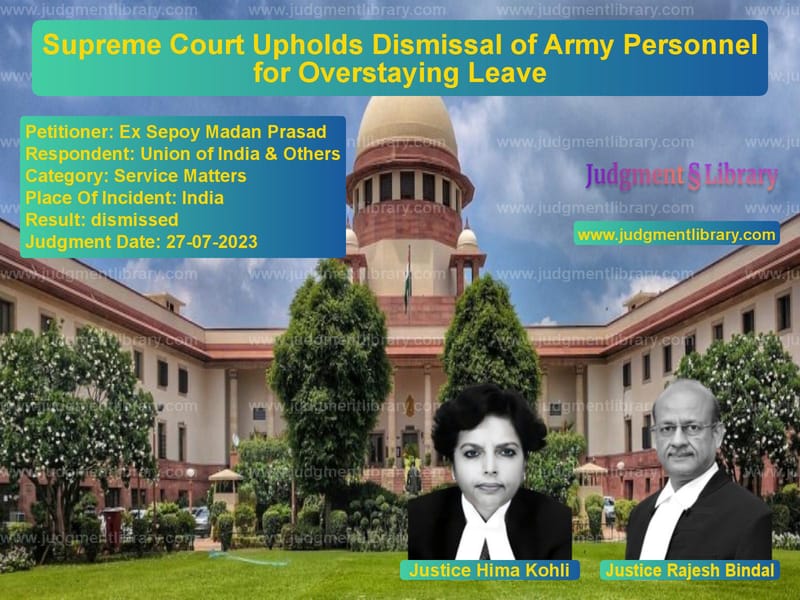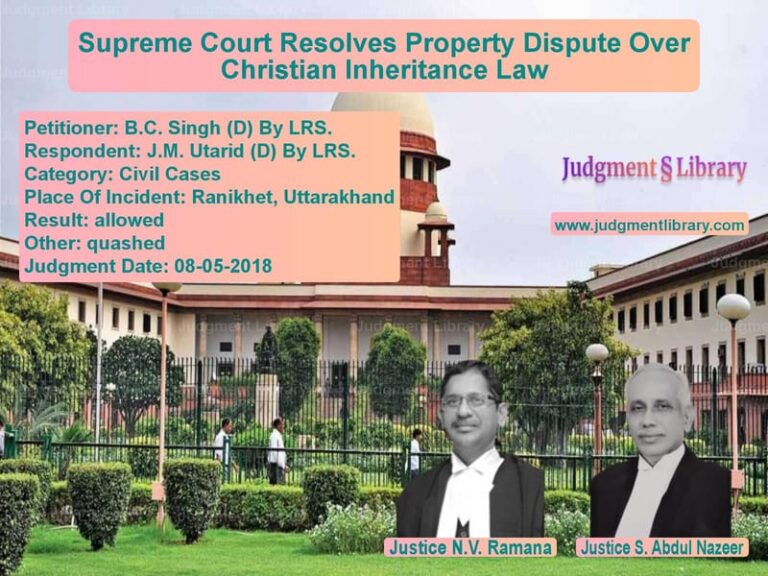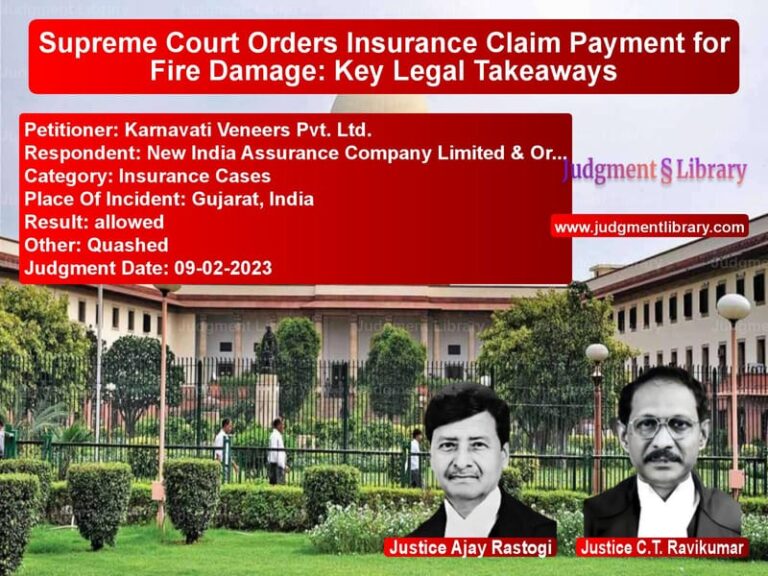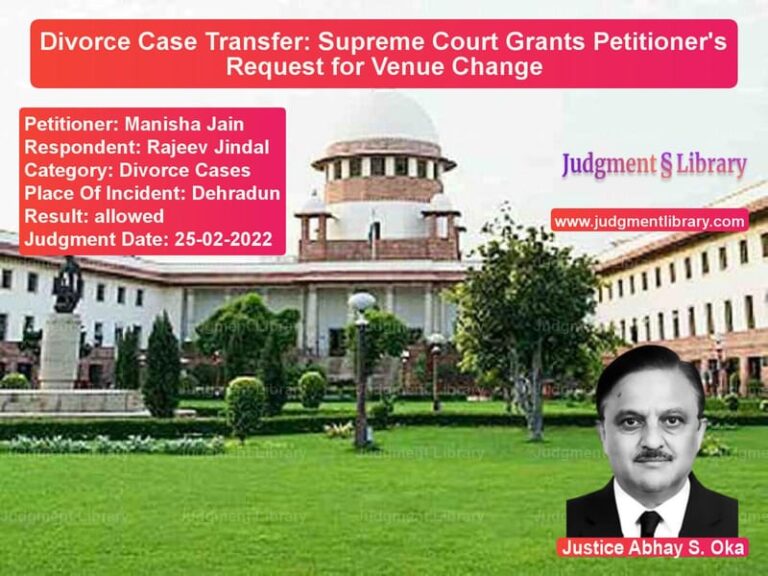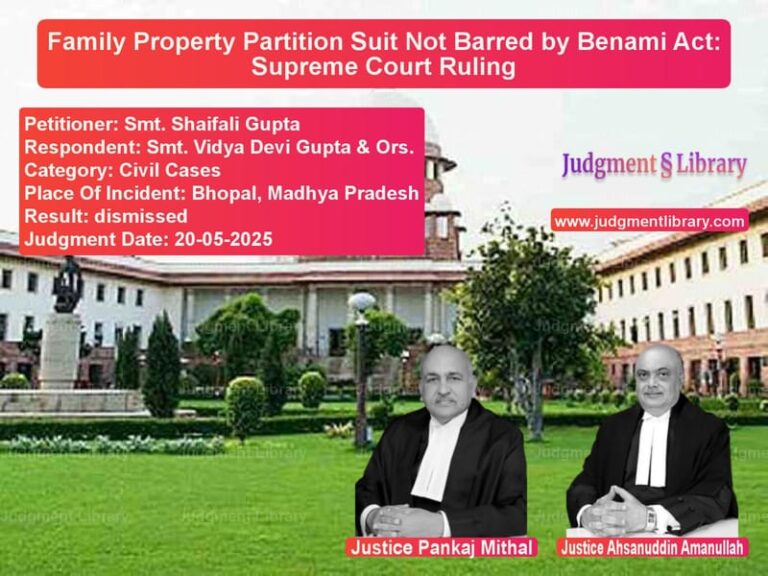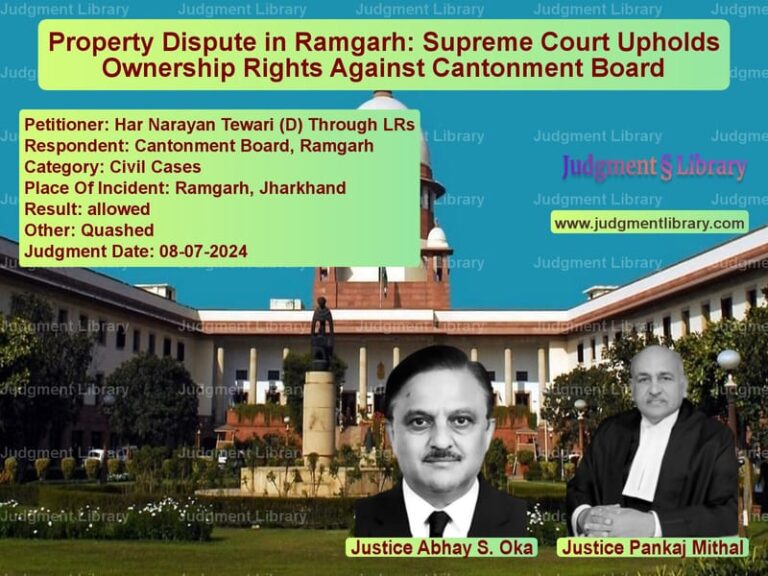Supreme Court Upholds Dismissal of Army Personnel for Overstaying Leave
The case of Ex Sepoy Madan Prasad v. Union of India & Others revolves around the dismissal of an army personnel for repeatedly overstaying his leave without sufficient cause. The Supreme Court upheld the Armed Forces Tribunal’s (AFT) decision, emphasizing the importance of discipline in the armed forces.
Background of the Case
The appellant, Ex Sepoy Madan Prasad, was enrolled in the Army Service Corps as a Mechanical Transport Driver on January 4, 1983. His dismissal was a result of prolonged unauthorized absence from duty.
Key Developments Leading to Litigation
- November 8, 1998: He was granted leave for 39 days, up to December 16, 1998.
- December 17, 1998: His leave was extended for 30 more days, until January 15, 1999.
- January 16, 1999: He failed to report back to duty, claiming his wife was ill.
- February 15, 1999: A Court of Inquiry was conducted under Section 106 of the Army Act, declaring him a deserter.
- May 3, 1999: He surrendered after 108 days of absence.
- August 24, 1999: A Summary Court Martial (SCM) was conducted, finding him guilty under Section 39(b) of the Army Act.
- October 4, 2001: His appeal under Section 164 of the Army Act was dismissed.
- 2015: The Armed Forces Tribunal (AFT) upheld his dismissal.
- July 28, 2023: The Supreme Court dismissed his appeal.
Arguments Before the Supreme Court
Appellant’s Arguments
Ex Sepoy Madan Prasad, through his counsel, contended:
- His wife’s serious illness required his presence at home.
- The punishment of dismissal was disproportionate to the offense.
- The maximum punishment under Section 39(b) of the Army Act is one year’s imprisonment, not dismissal.
- The Summary Court Martial (SCM) did not have the authority to impose such a severe punishment.
Respondent’s Arguments (Union of India)
The government, represented by senior counsel, argued:
- The appellant was a habitual offender, having overstayed leave on five previous occasions.
- No medical records were provided to substantiate his claim about his wife’s illness.
- Discipline is the cornerstone of military service, and repeated violations cannot be condoned.
- The Summary Court Martial acted within its authority to dismiss him.
Supreme Court’s Analysis and Judgment
A bench comprising Justices Hima Kohli and Rajesh Bindal ruled that the appellant’s dismissal was justified and proportionate.
Key Observations of the Court
1. Repeated Absences Indicated Gross Indiscipline
“It is apparent from the records that the appellant was a habitual offender. There were four red ink entries and one black ink entry against him before the present incident.”
The Court noted that his past record showed multiple instances of overstaying leave.
2. Medical Condition Not Substantiated
“The appellant did not place any document on record by way of the treatment summary or medical certificate of his wife to demonstrate that she was seriously ill.”
The Court ruled that his excuse for overstaying leave was unverified.
3. Plea of Returning to Duty Was an Afterthought
“The appellant failed to mention in his statement during the Summary of Evidence that he had reported to the Unit on February 18, 1999.”
The Court dismissed his claim of attempting to return earlier.
4. Discipline in Armed Forces Is Paramount
“Discipline is the implicit hallmark of the Armed Forces and a non-negotiable condition of service.”
The Court emphasized the importance of military discipline.
Final Verdict
The Supreme Court dismissed the appeal, stating:
“We do not find any infirmity in the impugned judgment. The appellant had been taking too many liberties during his service and did not mend his ways.”
The dismissal order was upheld, and the appellant’s plea for leniency was rejected.
Impact of the Judgment
This ruling has several legal implications:
- Reinforces military discipline: Absenteeism without valid cause will not be tolerated.
- Clarifies punishment for unauthorized absence: Dismissal can be imposed even without imprisonment.
- Sets precedent for habitual offenders: Past misconduct can justify harsher penalties.
- Requires proof for medical claims: Mere statements are insufficient to justify extended leave.
Conclusion
The Supreme Court’s decision in Ex Sepoy Madan Prasad v. Union of India underscores the importance of discipline in the armed forces. It affirms that habitual absenteeism cannot be excused, and strict military laws must be enforced to maintain operational efficiency.
Petitioner Name: Ex Sepoy Madan Prasad.Respondent Name: Union of India & Others.Judgment By: Justice Hima Kohli, Justice Rajesh Bindal.Place Of Incident: India.Judgment Date: 27-07-2023.
Don’t miss out on the full details! Download the complete judgment in PDF format below and gain valuable insights instantly!
Download Judgment: ex-sepoy-madan-prasa-vs-union-of-india-&-oth-supreme-court-of-india-judgment-dated-27-07-2023.pdf
Directly Download Judgment: Directly download this Judgment
See all petitions in Employment Disputes
See all petitions in Public Sector Employees
See all petitions in Disciplinary Proceedings
See all petitions in Judgment by Hima Kohli
See all petitions in Judgment by Rajesh Bindal
See all petitions in dismissed
See all petitions in supreme court of India judgments July 2023
See all petitions in 2023 judgments
See all posts in Service Matters Category
See all allowed petitions in Service Matters Category
See all Dismissed petitions in Service Matters Category
See all partially allowed petitions in Service Matters Category

